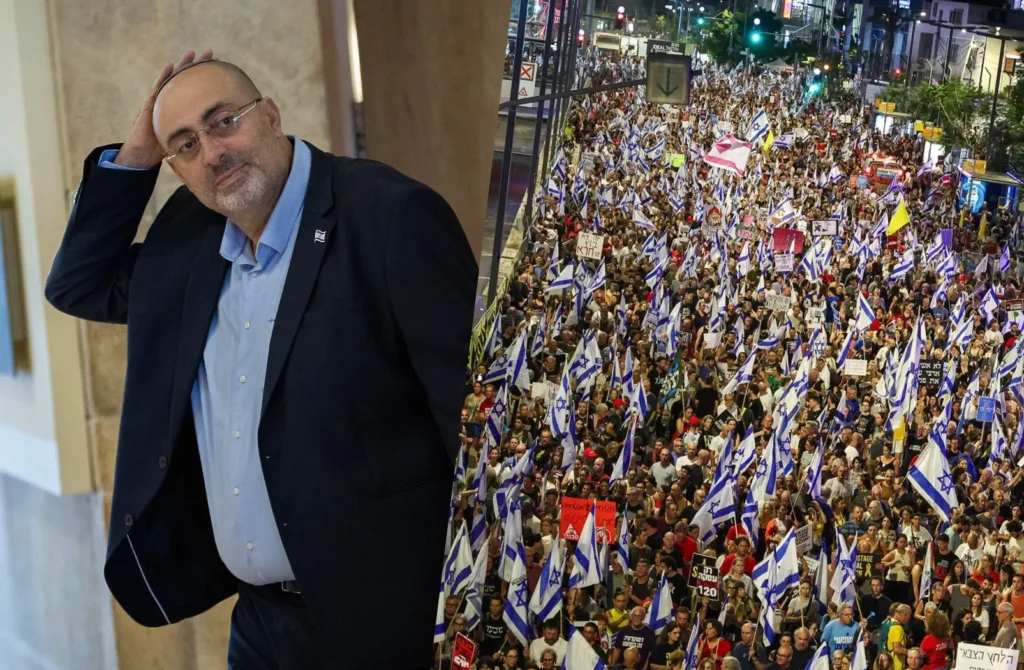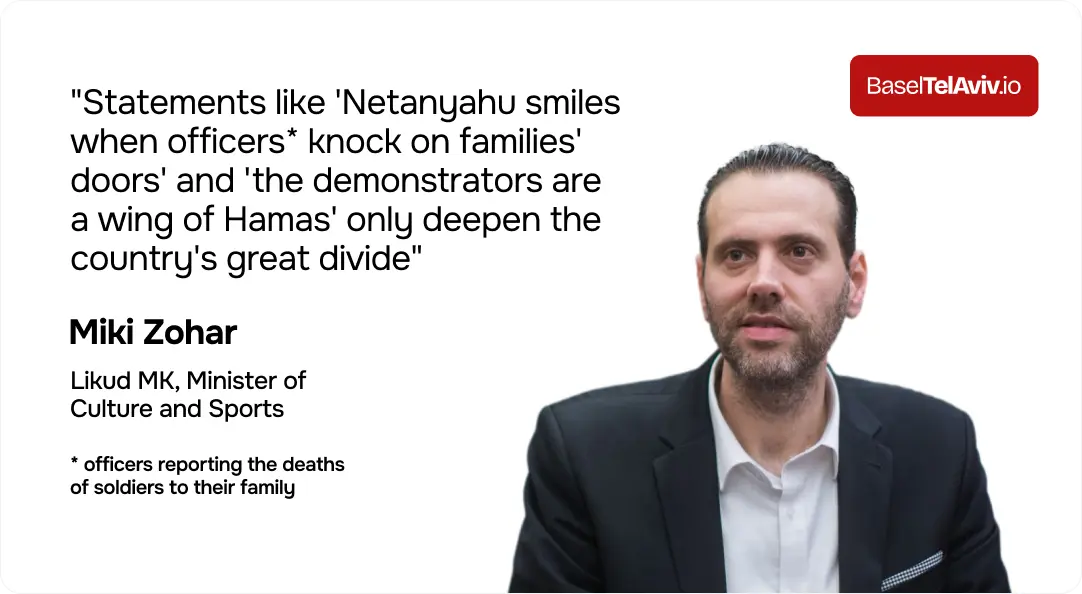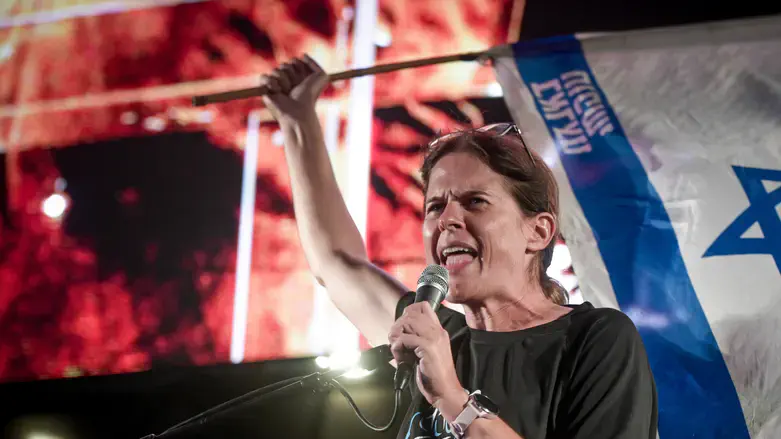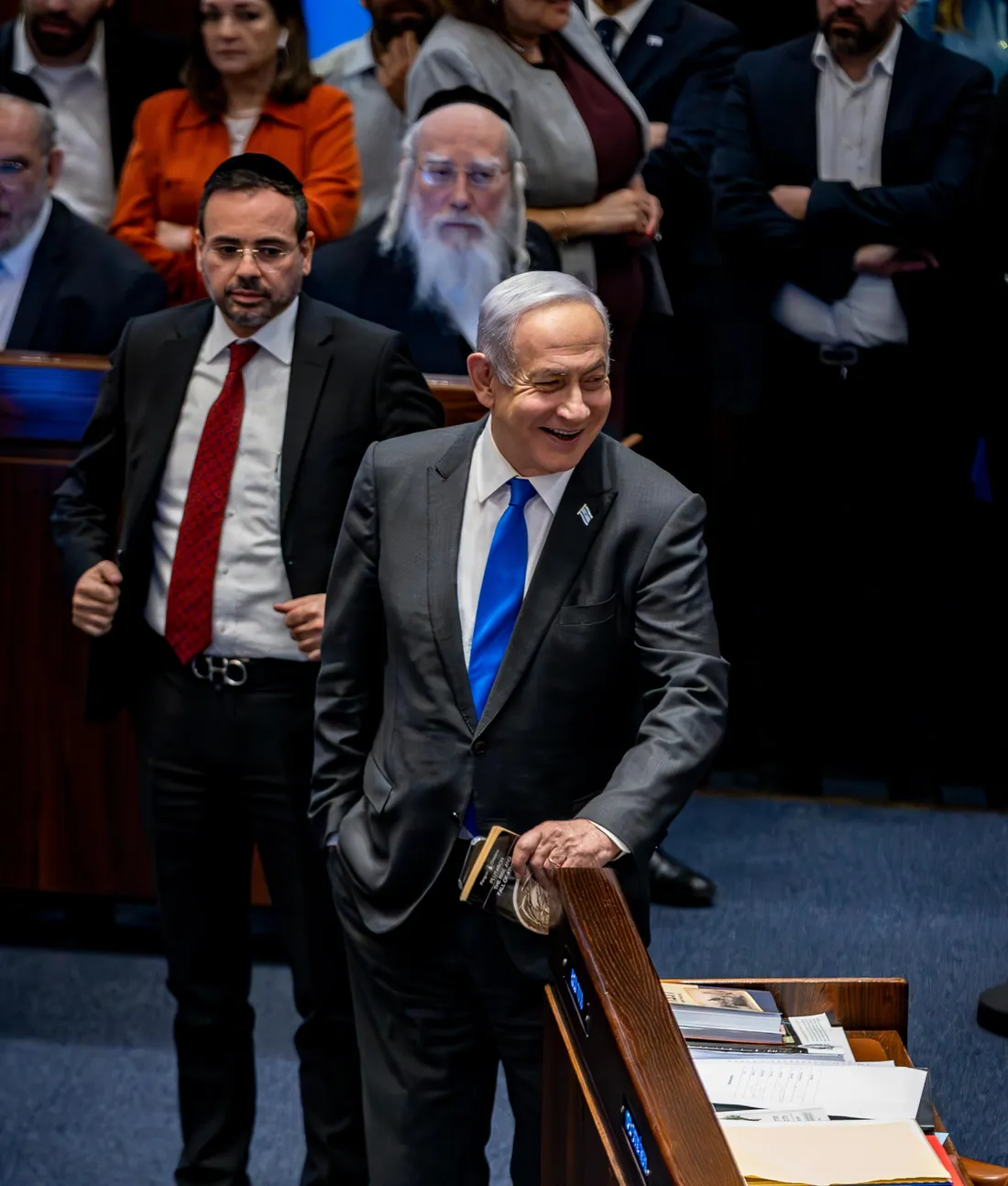
In an interview this morning, Likud MK Nisim Vaturi stated that “the protesters against the government are just another wing of Hamas.”
Vaturi later apologized for his words, but this is far from the first statement in a series of attempts by elected officials, journalists, and opinion leaders to discredit the protest movement.
Another Likud MK, Miki Zohar, commented that statements like Vaturi’s, as well as those made at demonstrations, are equally divisive in society.
This is yet another common accusation against protesters since the days of judicial reform – that anti-government demonstrations are supposedly divisive and play into the hands of external enemies.
Let’s put things in order and sort out who is divisive and who is not.
Let’s start with the basics. The right to protest, along with freedom of assembly and expression, is fundamental in a democratic society. These rights are among the few but powerful and effective tools that citizens have to communicate their disagreement with the authorities.
A protest is not a courtroom with its polite wording and high rhetoric; it often involves and should involve harsh criticism of public representatives and their actions. As long as statements made at a protest do not violate the law or incite violence, they are a legitimate form of expression, whether they are well-received or not.
Not only should mindful citizens, let alone elected officials, not disprove protests, even if they contradict their views, but instead, they should welcome and respect the right to express differing opinions.
A legitimate form of criticism of a legitimate protest can only be disagreement with its calls and demands. This represents an adequate, healthy public discourse.
Different forms of protest can provoke disputes and criticism. Spontaneous protests in unapproved locations that disrupt public order, like blocking highways or strikes, often irritate citizens. Many argue that such actions can lead ordinary citizens to reject the goals and demands of the protest altogether.
Conversely, there are times when protests highlight issues affecting a particular and often overlooked group within society, such as disability benefits, for instance. In such cases, various less publicly convenient forms of protest can be one of the few effective ways to bring public attention to these noteworthy issues.
When a protest reflects widespread dissatisfaction with government actions, and if the authorities consistently ignore the group’s demands, sometimes disruptive forms of protest are necessary to compel the authorities to engage in dialogue. This was evident last year during protests following the dismissal of the defense minister, which prompted the government to halt the judicial reform’s progress and initiate discussions about it.
But back to the present situation. Since the outbreak of the war, protests have decreased significantly, giving space and credit to the emergency government to act at such a critical time for the country with no distraction. The resurgence of protests only began gaining momentum a few months ago. Just as in January 2023, it did not happen out of thin air.
Then it was a public reaction to an attempt to substantially alter the constitutional order outside of a broad consensus on such a monumental change for the entire society.
In the current environment, it is a response of society to a variety of factors:
- Conducting warfare without a clear plan and strategy, with vague rather than concrete objectives, no transparent communication, and lack of accountability.
- Significant criticism of the Prime Minister’s decisions from multiple members of the political-military cabinet, alleging decisions are made based on narrow political interests rather than national priorities.
- The inability or reluctance to adopt a clear stance on the hostage crisis in any direction, which causes lots of confusion.
- Renewed attacks on the judiciary and law enforcement systems.
- Pushing forward a series of controversial, politically motivated laws, including two introduced this week that have sparked division and dissatisfaction among opposition and coalition members alike.
- Coalition deputies displaying disconnected behavior and making rude statements towards citizens, hostage and bereaved families, evacuees, and others.
- Persistent efforts to discredit, attack, and insult a significant portion of the population legitimately protesting against government actions.
The protests primarily stem from and react to the government and coalition MKs’ divisive actions rather than being the cause of division. In addition to criticizing the government, the protests consistently call for unity among the people.
So when Miki Zohar equates Nissim Vaturi’s statement with that of protest movement leader Shikma Bresler, who said, “Netanyahu smiled when officers knocked on the door (reporting soldiers’ deaths to their families),” he is inaccurate and misleads the public.
Nissim Vaturi insults a significant segment of society by accusing them of aiding terrorists simply for exercising their right to protest and express their views. It’s worth reminding that some MKs even went further, calling the protesters themselves terrorists.
In turn, Shikma Bresler’s speech at the protest, which one may agree or disagree with, addressed the recent events in the Knesset.
At that moment, the prime minister was caught smiling widely after orchestrating a political maneuver to push forward the contentious conscription law, coinciding with the publication of the names of soldiers killed in Rafah. The law itself and Netanyahu’s reaction to its enactment sparked widespread public outrage, symbolizing everything that has been happening lately. Shikma Bresler’s speech simply echoed this sentiment of outrage felt by the public.
It is the irresponsible conduct of populist leaders and their political maneuvers that are fracturing our society, rather than the dissatisfaction expressed by the people themselves.
On the contrary, had the government coalition acted responsibly and represented the entire nation rather than serving specific sectors or interest groups, the public reaction would likely have been far more subdued.
Trying to swap cause and effect and justify failed actions by blaming the public is nothing short of gaslighting at the national level.
Our responsibility is to resist being misled and to hold our elected officials accountable, not letting them to get away with such cheap manipulations.
Share
other materials



